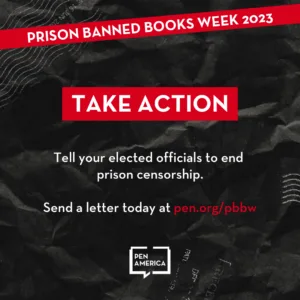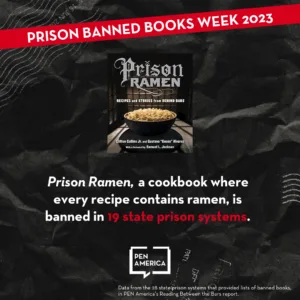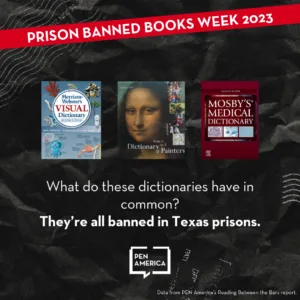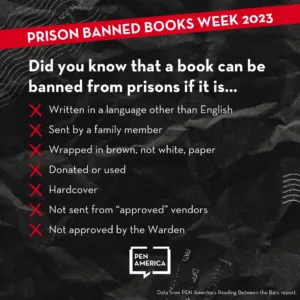Prison Banned Books Week Toolkit

Prison Banned Books Week Toolkit
Thank you for joining forces with PEN America during our inaugural Prison Banned Books Week (October 25th-31st). Together, we’ll help people understand that prisons are the largest censors in the US and provide ways to participate in our advocacy campaign targeting state leaders and prison officials.
In this toolkit, you’ll find elements to take part in and amplify awareness and actions.
PEN America released Reading Between the Bars: An In-Depth Look at Prison Censorship on Wednesday, October 25, 2023. The report’s main findings are:
- In 2023, PEN America found 84 percent of prisons now require that books are purchased from vendors the state or specific prisons opaquely select without publishing criteria for their choices or providing steps for booksellers to become approved.
- PEN America also found prisons are increasingly limiting the booksellers allowed to send books into prisons to a handful of “approved vendors.” This practice is a kind of content-neutral restriction, and has increased exponentially since 2015, when 30 percent of prisons wouldn’t allow books from nonprofits, independent bookstores, family and friends.
- The scale of this censorship is widely unknown due to a lack of record keeping. Idaho uniquely keeps track of approved vendor censorship and, in the first year the policy was implemented, the state denied one book for every four incarcerated people.
Other major findings in the research revealed:
- Approved vendor banning is on the rise and is outstripping content bans in limiting literature to incarcerated people.
- The most common reason for content-based censorship is “sexually explicit” which in practice censors art, medical and drawing books among others.
- A lack of documentation means that the true extent of carceral censorship is likely exponentially greater than the numbers featured in the report, which were found to be extremely high.
Social Media Campaign
- Tag your posts with #BooksNotBans
- Use the sample social copy below – feel free to make it your own!
 Did you know Florida prisons ban over 22,000 books and incarcerated people in Missouri can’t get books as gifts? This #PrisonBannedBooksWeek, urge your legislators and DOC officials to stop prison censorship. #BooksNotBans |  People inside are denied literature that discusses what it’s like to be incarcerated. Prison officials claim these books threaten security. #BooksNotBans |
 These books are denied because of “sexually explicit” images. Sexually explicit is the #1 reason for prisons to censor content. But, it’s applied to art books, medical books, popular magazines and drawing guides. #BooksNot Bans |  84% of prisons in the U.S. require books come from “approved vendors” which rarely include independent bookstores and always deny free books.#PrisonBannedBooksWeek |
Read and Share Their Stories
Incarcerated people suffer when they’re denied access to literature and learning. Read some of their stories here:
- “In solitary confinement, banned books are a lifeline” by Kwaneta Harris
- “In Prison, Books Are ‘Security Risks’: I Want to Expand My Knowledge. The Arkansas Department of Corrections Keeps Getting in My Way” by Richard Beebe
- “Censorship Starts in the Shakopee Prison Mailroom: There, Reading Material Gets Caught in a Web of Arbitrary Rules and Regulations” by Elizabeth Hawes
- “Why I Almost Went to Court to Learn Italian in Prison: After the Louisiana State Penitentiary Confiscated My Language Book and CDs, I Sued to Get Them Back” by John Corley
- “Ending Prison Censorship” by Moira Marquis
- “The Surreal Prison Censorship Regime” by Dylan Jeffries
- “Misadventures in Mail Censorship” by Robert Schaeffer
- “Censoring Women’s Health” by Kwaneta Harris
- “Ban the Bans: A better way to rid racism in prison” by Tomas Keen
- “I’m a prisoner fighting censorship. Here’s why our access to books matters” by Daniel Pirkel
PEN America has teamed up with prison book programs, higher education programs in prisons and other nonprofits that send literature to incarcerated people to tell elected officials that we do not support prison censorship.
OUR PARTNERS
Haymarket Books
Freeamerica
Know Your Rights Campaign
Justice Arts Coalition
San Francisco Public Library
The Free Black Women’s Library
Study and Struggle
Project NIA
Urban Library Institute
National Prison Writing Archive
INCITE
Library Services to the Justice Involved
Riker’s Memory Project
Cornell Prison Education Program
Noname Book Club
Inside Books
Asheville Prison Books
Big House Books
Appalachian Prison Book Project
The Hull Family Foundation
Seattle Books to Prisoners
Midwest Books to Prisoners
LGBT Books to Prisoners
Alabama Books to Prisons
Chicago Books to Women in Prison
Wisconsin Books to Prisoners
Claremont Forum
Prion Health News
American Prison Writing Archive